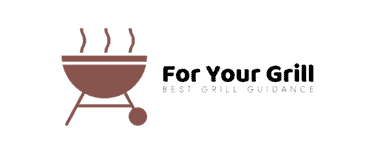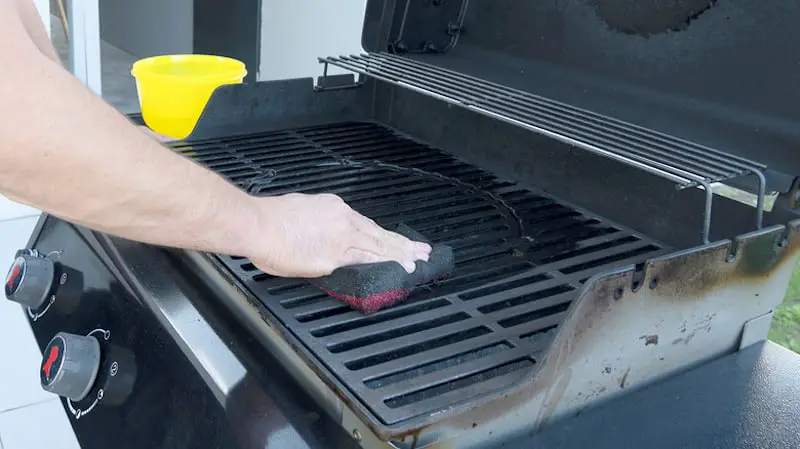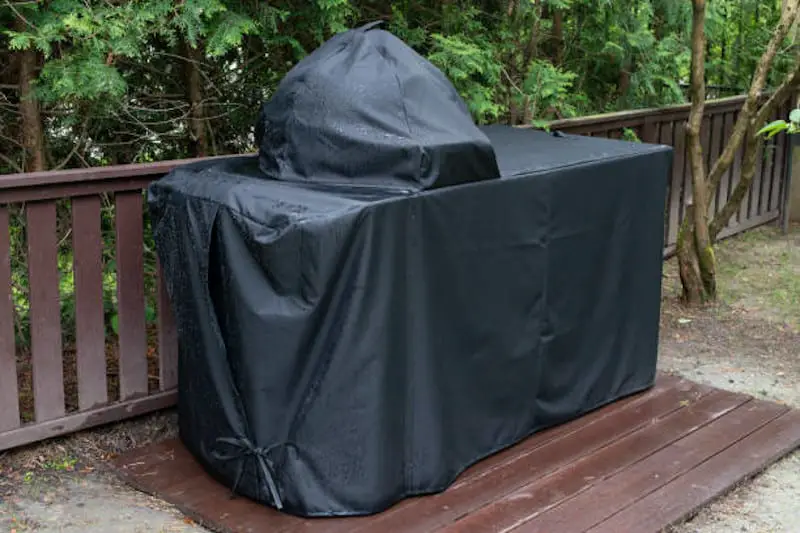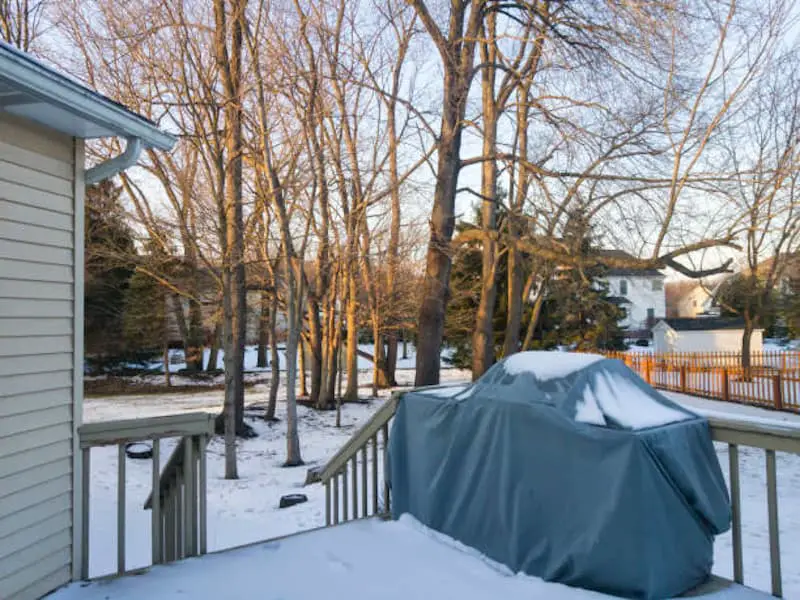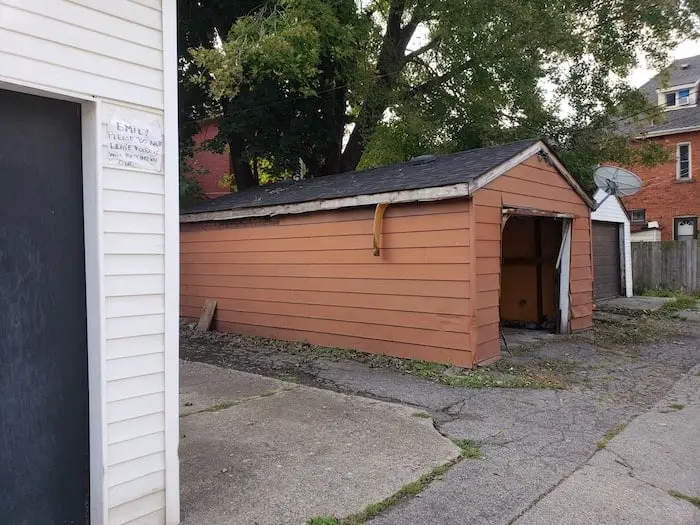
You are having fun grilling with your friends and family, your fun time is short-lived by the showers of rain that fall right in the middle of grilling. You are tempted to drag your grill into your garage in an attempt to save your burgers and hot dogs. It is even worse when the winter season forces you to abandon grilling for months. Whatever the circumstances, do not grill while in the garage or indoors for that matter.
Can I grill inside my garage? The answer is no. While else grilling may seem fun, when done indoors or in the garage it exposes you to so many risks. The risks range from health to fires among others. To be specific, if you are using a charcoal grill, propane grill, or gas grill, grilling from your garage is not an option.
If the weather is not conducive, you will have to place your life and that of your loved ones first at the expense of your comfort. That means not grilling indoors. However, does that entirely write off grilling during winter? The good news is no. Using the right grills, that is, electric grills (see Amazon), you can grill indoors. Electric grills are designed for use indoors without exposing you to any risks.
Keep reading to find out why you should not grill from your garage and when you can grill indoors. This article will also look at how to grill while indoors, grilling safety measure you should consider among other grilling questions
Why you should not Grill Inside your Garage
To start, smokers, charcoal and propane grill are specifically designed to be used for outdoor grilling. As such, using them while in the garage poses a great danger to your life and those within the compound.
First, indoor grills produce large amounts of Carbon Monoxide that is lethal. Carbon Monoxide does not have a scent nor a color. As such, you may not notice the gas while grilling. Eventually, the gas reduces your oxygen levels and you may suffocate.
Moreover, due to its gaseous nature, carbon monoxide spreads through vents and in extreme cases, when the volume is high, it may spread to other parts of the house. This may result in cases of suffocation or headaches, when the gas is mild, to other members of the family or friends. Either way, having this gas within your living space is exposing your life and that of others to danger.
Second, every outdoor grill has a warning alert placed on it when purchased. Part of the warning is that the grill has a flammable fuel source. With an example of a charcoal grill, you may need to use a charcoal fluid starter on your first day of grilling. This fluid is highly flammable. As such after using it, in case you place it next to any source of heat, the liquid may result in a fire outbreak. It is even worse when the fire is within a perimeter like a garage.
Also, cases of fires may result from leaking propane in your propane grill. For instance, your grill is leaking propane and you store it in the garage, the propane will spread to every crack of the garage without your knowledge. When you ignite the fire to grill your burgers, the leaked propane will explode causing a fire that may bring down the entire house.
Grilling in the garage when the door is open can only do so much. This is because the leaked propane will be within the walls of the garage and so the explosion within the walls is inevitable. An open door can only help you escape if you are lucky enough. Bottom line, fires due to grilling inside may cost you properties and even lives of the people you care for, avoiding them is the best shot you have.
Besides, another possibility of a fire outbreak may result from the items stored in the garage. If you have glue, tires, newspapers or any ignitable fluids, then you are susceptible to explosions in the garage ones you lit your grill. to avoid such a situation use your grill in an open space where the air is in constant circulation.
Another effect of using a grill in your garage is that the continuous grilling indoors will cause every wall to have an unattractive grease coating with time. In turn, this will necessitate the need to repaint your walls which is an unnecessary cost
All these consequences of using a grill indoors puts our lives and those of others in danger. Similarly, these consequences also translate to the loss of property. So to stay safe and still enjoy your streaks, use your grill outside.
When Can I Use Indoor Grills?
Primarily, grilling is an outdoor activity, however, situations that are mostly weather oriented, like a rainy afternoon, may create the need to grill under a shelter. Naturally, people tend to lean on using a garage for indoor grilling since it is closest to an open space
That said, there are conditions for indoor grilling. Firstly, grilling within a room should be done when using indoor grills only. Indoor grills are electrical powered. There are only two types of electrical grills; open grill and contact grill.
The open grill simulates the normal outdoor grills in its design and cooking method. The significant difference between these two grills is that the open grill is powered by electricity and it is easier to clean compared to the outdoor grill
The contact grill resembles the grill model by the famous George Fireman. It has an open like clamshell. This kind of grill like this is great for making sandwiches. It, also, grills on both sides giving it an upper hand as compared to other grills. Similarly, the contact grill requires little monitoring while cooking. Nonetheless, one of its shortcomings is that it cannot be used for grilling large amounts of food.
Other than electric grills, you can use a grill pan for your indoor grilling. The grill pan has a heavyweight with high rides. As such, it allows you to lift your food away from collecting grease. Another advantage of this grill is that it is very affordable.
So what if I already have an outdoor grill? Well, do not fright. If you do not want to incur the additional cost of purchasing an indoor grill, you may consider creating space for your outdoor grill within your compound.
This may be done by putting up a gazebo, picnic pavilion, canopy, or any other shelter for grilling during adverse weather. The set up should only shelter you from the rain and not be closed completely. It should also be a distance away from your house. With this, you can grill under the dashing rain or the snow without having to make foggy hotdogs.
All the above are alternatives that you may consider to use in case you insist on indoors grilling or during harsh weather.
How to Use an Indoor Grill
The following is a guide on how to use an indoor grill effectively. Note that it can be done in any preferred order
- To start, if you intend to grill marinated meat on an indoor grill, you have to place it on a cooling rack for it to drain. This is because indoor grills do not drain meat effectively. As such, if the meat is not pre-drained the result may be marinades of grilled meat that I believe nobody wants.
- The next step is to trim excess fat from the meat. Excess fat is usually the lead cause of smoke due to excessive burning. Unlike outdoor grilling, grilling in a garage or any room means that the smoke is retained within the space. As such, the best way to manage this smoke is to minimize its production by trimming excess fat before grilling
- Grilling while indoors is done like outdoor grilling. You need to pay attention especially since it is a risky affair when enclosed
- If you want to baste, lightly brush basters on your meat and make sure you do not spill to avoid smoke
- You should also consider placing the grill close to a window in case of any fires. It is also important to keep a fire extinguisher in close range when grilling in a garage or indoors.
Safety Measures you Should Consider when Grilling
- Clean you Grill
People prefer to jump to grilling their food right from the start. However, a dirty grill exposes you to the risks of flare-ups. Also, a dirty grill may alter the original taste if your grilled food. As such for the best experience, be intentional with removing grease and fat build-up from your grill gates. Clean the grill every time you use it.
For more information: Can You Use Oven Cleaner On A Grill?
- Grill Your food with Batches
This one of the most underrated safety measures of grilling. When you overload your grill especially with fatty food, too much fat may drip to the grill flames causing flares. However, to avoid this you can grill your food in decent batches.
- Use a Meat Thermometer
Unless you intend to eat half-cooked meat, I recommend you use a meat thermometer to tell if it is truly cooked. It is very common to see grillers deciding the meat is cooked by just looking at it. In case the meat is not cooked thoroughly, it may expose you to the dangers of uncooked meat including harmful bacteria.
- Shut Down your Grill
When you are through with grilling, make sure you turn off the grill. Turn off the burners or the fuel source if you are using a gas grill. On the hand for charcoal grills, make sure the coal cools completely. When they are cool, place them in a metal container.
- Be prepared for Fire
To mitigate cases of fire flares you can use baking soda. This means that you have to have it within a close reach. In case of large fires, a fire extinguisher should be within proximity. Therefore, when grilling you should be aware of the possibility of a fire outbreak and have the skills to deal with it.
Related Questions
- Is the flavor of indoor grilling different?
Unfortunately, yes. You cannot compare the taste of meat grilled outside and that of meat grilled indoors. The taste of outdoor grilled meat is more authentic and has that distinctive grilled taste. - Does eating grilled food expose you to cancer?
Yes, burning any food with fat leads to the generation of cancer-causing cells; this means that consuming grilled food exposes you to cancer. - Is indoors grilled food healthier than outdoor grilled food?
Indoor grilled food exposes you to disease as much as outdoor grilled food. As said above, the concept is that any fat burning leads to cancer-causing substances. As such, indoor grilling is not an exemption.
